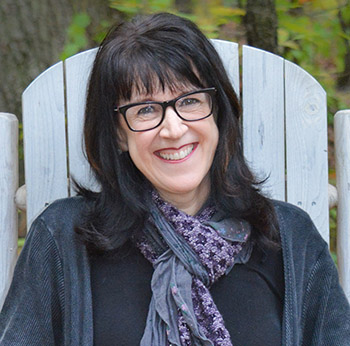
Julie McDaniel
Within an hour of learning about IWitness for the first time, Julie McDaniel could already envision how its testimonies and activities could enhance her work as Student Safety and Well-Being Consultant at the Oakland Schools district in Michigan.
At Oakland Schools, McDaniel holds workshops with school staff, students and the community on topics dedicated to creating and maintaining safe and supportive learning environments, including bullying prevention, trauma and loss, and restorative practices. She is also a literacy teacher and Positive Behavior Interventions and Supports (PBiS) coordinator at Oakland Opportunity Academy, an alternative high school.
She first learned about IWitness and its IWitness Detroit program though Amy Bloom, social studies consultant for the district, who thought McDaniel might find the resources in IWitness useful.
During an IWitness training session for district staff led by USC Shoah Foundation Acting Director of Education Claudia Wiedeman, McDaniel quickly realized IWitness’s potential to really impact her work.
“I saw how intact lessons could be adapted for deep work in bullying prevention,” McDaniel said. “I began to imagine how I might use the video testimonies for illustrating empathy, resilience and the effects of trauma.”
In the training, McDaniel learned about the 100 Days to Inspire Respect program, in which new testimony-based educational resources relating to themes of empathy, tolerance and cultural understanding are released every day from January 20-April 29. She has already introduced 100 Days to her colleagues at Oakland Opportunity Academy and said the teachers were very impressed by the wealth of resources available.
McDaniel also incorporated IWitness into a her recent full-day bullying prevention workshop, called “Beyond Bullying.” In the workshop, McDaniel stressed that bullying can lead to hate crimes which can ultimately lad to crimes against humanity. She focused on the role of bystanders and drew upon Barbara Coloroso’s TED Talk, which is about her experience in Rwanda after the genocide – so leading participants through IWitness activity The Bystander Effect fit perfectly into her training.
McDaniel praised The Bystander Effect activity as a lesson of high quality. Its written response questions about acts of aggression students have witnessed in their own lives, coupled with video testimonies about the genocide in Rwanda, require students to connect on a personal level and develop a mission for how they will stand up for others.
“How powerful it was to see how some of the roles of the bystander in a bullying situation can evolve into complicity in acts of genocide,” she said. “Participants began to understand how Barbara’s caution to address the imbalance of power in a bullying situation can be the first line of defense in preventing crimes against humanity.”
However, it is important to remember, McDaniel said, that bullying is an adult problem. Bullies believe themselves to be superior over the person they are bullying – and children and young people learn this power structure from the adults in their lives. So IWitness not only teaches students, but educators as well.
“The video clips in IWitness are providing learning opportunities for adults to see how a detached society will nurture the notion of superiority into acts of discrimination and abuse,” she said. “Bullying is not a rite of passage.”
Next, McDaniel will use IWitness in an upcoming workshop that explores the concepts of resilience, grit and post-traumatic growth. She intends to show testimonies of Holocaust survivors to illustrate the effects of trauma on life choices, communication and other ways not traditionally acknowledged.